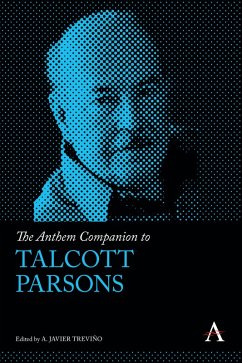This collection of eleven chapters, written by scholars who have frequently made Parsons's ideas a central component of their work, is set in two parts. In Part I, consisting of chapters 1 through 6, a variety of issues that were of particular empirical and theoretical concern to Parsons at various points in his career are analyzed, critiqued and updated: German totalitarianism, political power in liberal democracies, the student protest movements on U.S. college campuses, the therapist-patient relationship in psychotherapy, the phenomenon of death and the reception of his ideas on the social system. Together these chapters point to some of Parsons's interests in political and humanist matters, all of which, at one time or another, were-if not always tidily, at least satisfactorily-subsumed within and addressed by his general theory of action as it continued to develop. Thus, Nazism as a totalitarian social structure could be explained by the pattern variables, the notion of power became one of the generalized media of interchange, the expressiveness inherent in the 1960s campus unrest and in the therapeutic relationship was understood in terms of the AGIL schema and death was considered in connection with the telic order.
Part II, which includes chapters 7 through 11, focuses on two interrelated themes that characterize the late phase of Parsons's work: progressive evolution and the societal community. Beginning in the mid-1960s the process of evolution-both in its societal and cultural aspects-was given primary of place by Parsons in further explaining social differentiation and integration-but also, and more fundamentally, in dealing with the problem of social change. For Parsons, evolutionary development, with crucial cultural innovations taking place in the "seed-bed" societies of Israel and classical Greece, had culminated in modern society, which in the Western context brought about the industrial, democratic and education revolutions, and in the American context led to the development of an "institutionalized individualism" reinforced by the core value of "instrumental activism." Both of these latter concepts are given extensive treatment in Parsons's last book, the posthumously published American Society. Of special significance in this work is the notion of the societal community-particularly of the American variety-that Parsons contends contributes to internal integration though citizenship and the normatively defined obligations that citizenship engenders. In short, Part II demonstrates the importance that Parsons gave to modern civil society in general as well as to the exceptional status that he attributed to American society in particular.
Part II, which includes chapters 7 through 11, focuses on two interrelated themes that characterize the late phase of Parsons's work: progressive evolution and the societal community. Beginning in the mid-1960s the process of evolution-both in its societal and cultural aspects-was given primary of place by Parsons in further explaining social differentiation and integration-but also, and more fundamentally, in dealing with the problem of social change. For Parsons, evolutionary development, with crucial cultural innovations taking place in the "seed-bed" societies of Israel and classical Greece, had culminated in modern society, which in the Western context brought about the industrial, democratic and education revolutions, and in the American context led to the development of an "institutionalized individualism" reinforced by the core value of "instrumental activism." Both of these latter concepts are given extensive treatment in Parsons's last book, the posthumously published American Society. Of special significance in this work is the notion of the societal community-particularly of the American variety-that Parsons contends contributes to internal integration though citizenship and the normatively defined obligations that citizenship engenders. In short, Part II demonstrates the importance that Parsons gave to modern civil society in general as well as to the exceptional status that he attributed to American society in particular.
Dieser Download kann aus rechtlichen Gründen nur mit Rechnungsadresse in A, D ausgeliefert werden.


